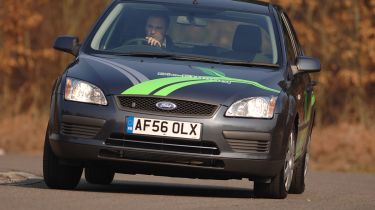Ford Focus FFV 2007 review
The Focus runs on cheaper, cleaner biofuel and costs no more than the regular version

In many ways, the Focus FFV is a no-brainer. It doesn't cost any more than a conventional 1.8 LX and has the benefit of running on E85, when you can find it. As an added bonus, you'll get a car that remains a class leader and can still entertain like no other family hatch. However, we can't help thinking that in the short-term, a diesel-powered TDCi would give better performance and cancel out its extra fuel cost with superior economy.
Biofuel is the new buzz word for motorists looking to save cash at the filling station. With prices set around 20 pence per litre below petrol and diesel, buying a car which runs on ethanol-based biofuel is one of the cheapest ways to get from A to B.
That's a fact not lost on Ford, which this week has added the ethanol-sipping Focus Flexi-Fuel Vehicle (FFV) to the price list of its class-leading family hatchback range, giving the green fuel an even brighter future.
The Focus FFV is already a top-seller in Sweden - where biofuel is widely distributed. But Ford is determined to get the ethanol-powered hatch, plus the C-MAX FFV people carrier, on sale in more countries in an effort to promote its green credentials.
On first impressions, you could be forgiven for thinking you've been sold the wrong car. Apart from the lurid green decals of our model, the exterior is basic Focus LX. Look a little more closely, though, and you will find a couple of small green and black badges on the boot, plus an electric socket the size of a 50 pence piece nestling on the front grille.
This connector runs into the engine bay - which is where all the changes have taken place. As with Saab's 9-5 BioPower executive car, the Ford uses E85 - a blend of 15 per cent unleaded and 85 per cent bioethanol - and can use standard petrol as well. But below minus 15 degrees Celsius, the fuel needs to be pre-heated in order for the engine to start. To achieve this, plug-in electric elements are added to the engine block, which are then heated via the socket on the grille.
Other modifications to the 1.8-litre Duratec powerplant have been limited to harder valves and valve seats to cope with the loss of lubrication that comes with regular unleaded.
Variable ignition mapping has also been added to the car's engine management system so it can deal with every potential petrol/biofuel mix that could occur in the tank. So what benefits does Ford say biofuel offers over conventional petrol? Well, unlike rival manufacturers, the firm doesn't claim any increase in power when the Focus FFV is using pure E85, but CO2 emissions drop by two-thirds compared to the standard model.
Performance from the 123bhp unit is brisk, but the hatchback certainly won't set the tarmac alight. This isn't really a negative, however, and the smooth-spinning powerplant delivers exactly the same performance whether it's running on traditional pump fuel or bioethanol.
This feeling of normality extends to the rest of the driving experience - and that's no bad thing. As ever, the Focus's chassis shines the brightest, with entertaining and forgiving handling even on this lowly LX-spec model. The ride is excellent, gliding over poor surfaces where rivals crash and fidget. And while the interior is a little dull, it is well screwed together, comfortable and admirably refined.
There is one major drawback in choosing a Focus FFV, though. At the moment, there are only a handful of E85 filling stations dotted around the country. So unless you live close to one of these, then the vast majority of your driving will be done using dirtier and costlier petrol.
However, Ford claims it is dedicated to promoting bioethanol, and is working to remedy the shortfalls in supply. In fact, it's so committed to the cause that the Focus will be joined by FFV versions of the S-MAX, Galaxy and new Mondeo in 2008. In the meantime, you will have to do a little research into the availability of E85 in your region - but if the fuel is easy to find, the Focus FFV is worthy of serious consideration.







